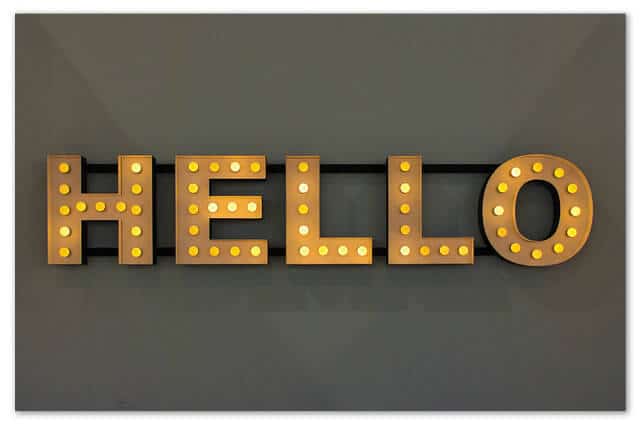How NOT To Offend Anyone, Anywhere, Ever – Or How To Say 'Sorry'
Last week, I wrote about LingQ’s new 1000 word Challenge and mentioned that it was inspired by a similar challenge created in England by the British Council. I also mentioned that the Council thought that people outside of the UK might think Brits are arrogant if they don’t learn to speak languages other than English.
After publishing the post, I got a long email from someone in Britain who was offended that I called British people arrogant. I didn’t – obviously – (the British Council did) but I apologized anyway. I don’t like offending anyone, even though sometimes it is impossible not to.
No Word For Please!?
First of all – I am Danish – and in Denmark THERE’S NO WORD FOR PLEASE, POR FAVOR, S’IL VOUS PLAÎT, BITTE… Can you believe that? How rude…
Secondly, as a Danish person living in Canada, people sometimes perceive me as being a little brass and cold. I try extra hard not to be and to say ‘thank you’ and ‘please’, whenever appropriate. But sometimes that Danish brashness shines through.
This guy explains Danes really well:
Let’s Talk About This.
The email from the offended Brit got me thinking, that although this is about language learning, I think it’s worth talking about how we might – at least try not to offend others – when interacting with people from other cultures. And just for good measure – and for the sake of language learning – I’ll throw in a few polite words in different languages here and there. One thing is certain, people do not get offended if you make an effort to speak their language while you’re visiting. They might even think you’re pretty cool for trying.
Greet Staff When Entering A Store
If you watch the video above, you will note that Mark from Woltersworld says that customer service in Denmark is bad. It astonishes Danes that in Sweden, which is really close by, you say a polite ‘Hallå’ and give a little nod when entering a store. Or if you happen to be in France, you say: ‘Bonjour’. Italy: ‘Ciao’. Spain: ‘Hola’ or in England/Canada/USA it is thought of as common courtesy to say ‘Hello’ to the staff.
It took me a while to understand that when a Canadian cashier says: ‘How are you?’ which they all do. It is merely because it’s considered good customer service, they don’t really want my entire life story. At first I would actually tell them how I was. When I realized they didn’t care all that much, I thought to myself, then why do you ask? (And then I’d be a little offended) I have finally learned to say: ‘I am fine, how are you?’
Don’t EVER forget First Names In North America.
I am terrible with names, really bad, I don’t get terribly offended if people can’t remember mine and even less so if they can’t pronounce it. It’s a weird name to English speaking people, so why would they? And for the most part they can’t. But over here, people get strangely offended if you can’t remember theirs. So if you’re new to North America and you meet someone that you think you might come across again; REMEMBER HIS/HER NAME!
Also, when you want to pass someone on the sidewalk, say ‘Excuse me, please’ and if you bump into someone on said sidewalk, say: ‘Sorry’. Doesn’t matter whose fault it was, just say ‘sorry’.
In France, Formality Equals Politeness
In English everybody is ‘you’. It doesn’t matter how important they are. Everybody is a ‘you’. You can throw in a ‘Sir’, ‘Miss’ or ‘Madam’ to make people feel important. But when asking them how they are, the informal ‘How are YOU, sir? – is still appropriate. In France that’s not how it works. You can’t just go around calling everyone ‘Tu’, unless you have their permission.
The formal ‘Vous’ is more appropriate. I think that goes for the Francophone part of Canada too, I’m not sure, I’ll have to ask around.
The word ‘Pardon’ is considered very polite in the English language. But in France ‘Pardon’ means you better get out of the way. It means someone wants to get by you in a hurry and you’re in the way.
When In Rome (or elsewhere in Italy)
Italians produce fab wine, they love it, they’re proud of it, and so they should be. They enjoy their wine and don’t get completely hammered when they drink it, they might also get offended and think it’s inappropriate if you do. The same rule pretty much applies in all the wine producing European Mediterranean countries – Spain, France and Portugal. So remember that, if you’re a bit of a wino like me. Don’t get wasted.
If you do get a bit of a buzz going, despite me telling you not to, and should that buzz cause you to bump into an Italian, you apologize by saying: ‘Scusi’ (Excuse me-ish). Or if you get too close to someone on the sidewalk and want to walk by them, you politely say: ‘Permesso?’ (Please allow me).
Bowing Is Big In Japan
OK, so a little confession – I have never been to Japan and I don’t know all that much about Japanese culture. I know a few things from movies, but who is to say how much of that is true? If I ever go to Japan I want to make sure I don’t offend anyone. I had seen something about bowing in the movies and wondered that, so I asked Fumiko, a lovely Japanese lady who sits next to me at the office, and she told me the following:
In Japan, it is commonplace to bow. And in Japanese culture it’s better to bow more often than not. A smile is associated with a deep nod of the head, and it is considered polite to bow when you’re being introduced to strangers. You give and receive important things with both hands, such as change at the store, tea at a tea ceremony and even when receiving business cards.
It is also polite to take your shoes off indoors and sometimes at restaurants, but don’t worry they’ll give you some indoor shoes to wear.
Overall Japanese culture is very polite, they say thank you a lot and have different expressions for thank you, ‘arigatou gozaimasu’ means ‘thank you’ while “arigatou gozaimashita” means something like “thank you for what you just did.’
And then there’s: ‘sumimasen’, which is a good word to know in Japanese as it officially means ‘Excuse me’, but it also means ‘Sorry’ and of course, ‘Thank you’.
I Don’t Mean To Offend You
I hope that if you are reading this and I haven’t mentioned your country or culture that you will write a little comment about how NOT to offend people where you’re from.
My final thought is that no matter how hard we try in life, there’ll come a time (probably more than once) when someone will get offended by something you say or do – but luckily we always have the option of apologizing, and in many different languages. Here are a few ways to say ‘sorry’ in different languages:
Danish: Undskyld
Punjabi: Māfī
Swedish: Förlåt
Finnish: Anteeksi
Thai: H̄ı̂xp̣hạy
Catalan: Perdó
Portuguese: Perdão
Filipino: Pasensya/Paumanhin
Hungarian: Bocsánat



